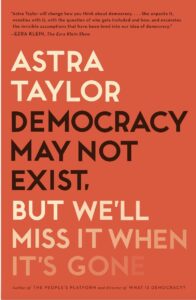Over there

On the Donegal coast.
Quote of the Day
Last Friday’s ‘Quote of the Day’ prompted Kevin Cryan to email me about one of the most widely shared anecdotes about Joseph Heller, the author of Catch-22.
At a party in the Hamptons, a friend of his remarked, “Joe, you know, this hedge fund manager makes more money in a single day than Catch-22 has made in its entire history.”
Heller, without missing a beat, replied, “That may be true, but I have something he will never have.” His friend asked, “What’s that?” Heller grinned and said, “Enough.”
— which, Kevin wrote, “highlights his wit and ability to poke fun at himself … proving that for him, success wasn’t just about financial wealth, but about creating something enduring and meaningful”.
It does. But Heller’s answer also triggered an epiphany I had way back in the 1980s. I remember asking myself the question how will I know when I earn enough?. And one gloomy November afternoon, sitting in our house in central Cambridge, I came up with the answer: “when I can buy hardback books in Heffers (then the leading bookshop in town) without worrying about the price.”
Musical alternative to the morning’s radio news
Delorentos | Home Again
Long Read of the Day
This is going to be a week of anniversaries related to the Second World War, and I thought it might be appropriate to start with a striking essay by a great military historian, Anthony Beevor. His books — on the battle of Stalingrad, and the taking of Berlin — are masterpieces, though very grim reads in places.
This essay isn’t grim in that sense. But it’s a vivid reminder that hindsight is really the only exact science.
Eighty years ago this week, American troops liberated Dachau concentration camp just north of Munich. German forces in Northern Italy surrendered. And Hitler dictated and signed his last will and testament in the bunker. Yet although the Third Reich was collapsing on every front, the end of this war, which had killed millions of human beings, still depended on the life of just one man.
The Allies had made a fundamental mistake when they believed after the bomb plot of July 1944 that an army which had tried to kill its own commander-in-chief must be in a state of collapse. What they could not grasp was that the failure to kill Hitler meant that he, the SS, Gestapo and Nazi Party would force everyone to fight on until his death. It was once again the problem of democratic confirmation bias, which prevents us from properly understanding the mentality of dictators and their entourage.
The Allies, or more specifically the Americans, made a similar mistake understanding Stalin. Roosevelt, with the arrogance of his great charm, thought he could make Stalin a friend. Eisenhower also thought that he could win Stalin’s trust by passing on his plans for the western Allies’ advance across Germany. Both were misled in return…
Hope you enjoy it.
So many books, so little time

Screenshot
Just bought this. Two reasons: (a) I really liked her earlier book The People’s Platform; and (b) Ethan Zuckerman has chosen it as a set book for his course on ‘Defending Democracy in a Digital World’ at Mass Amherst.
Linkblog
Something I noticed, while drinking from the Internet firehose.
- Jensen Chang: ”First thing to understand: 50% of the world’s AI researchers are Chinese”. Link
This blog is also available as an email three days a week. If you think that might suit you better, why not subscribe? One email on Mondays, Wednesdays and Fridays delivered to your inbox at 5am UK time. It’s free, and you can always unsubscribe if you conclude your inbox is full enough already!**
